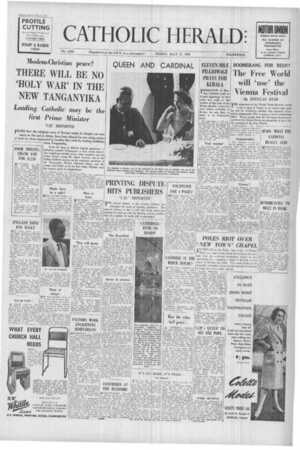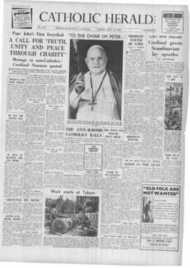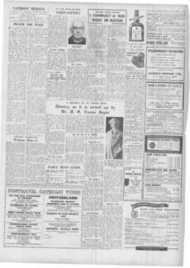Page 5, 10th July 1959
Page 5

Report an error
Noticed an error on this page?If you've noticed an error in this article please click here to report it.
Tags
Share
Related articles
Notes And 'column Comments
A Christian Peace Notes And Comments The Christians Of...
Christians Flee Saddam
1939 — A Conscientious Objector's
Strong Vatican Feeling About Fate Of Poland
Moslem-Christian peace?
THERE WILL BE NO `HOLY WAR' IN THE NEW TANGANYIKA
Leading Catholic may be the first Prime Minister
`C.H.' REPORTER
FEARS that the religious wars of Europe might be fought out once
again on the soil of Africa, have been allayed for one rising nation at least by views expressed in London this week by leading Catholics from Tanganyika.
From the land of Africa's highest mountains — including majestic Kilimanjaro—a land whose immediate neighbours include seven other countries and the Indian Ocean, comes Mr. Julius Nyerere, one of the leading Catholic laymen on the continent, president of the Tanganyika African National Union, and the person most likely to be the first Prime Minister once the country gains its independence.
Mr. Nyerere, here to meet government officials — he has already seen Lord Perth----and at the same time have a holiday, was most optimistic when I met him last week at a reception organised by the Sword of the Spirit.
Might there
be a split ? WITH 2,000,000 Moslems and
" 2,000,000 Christians (the majority Catholics) among its population of nearly 9.000,000, might there, I asked, be a split concerning the future on religious lines, with all the bitterness and hatred that a religious strugele entails ?
"I am confident that the present good relations between the different religions in my country will continue," he said. "Catholics, Protestants and Moslems are worlsing together successfully and I see no danger of a split ever happening."
Hints of danger •
THE same excellent spirit of co-operation between Moslem and Christian was emphasized by Chief Xavier Usangila
Zulu. Paramount Chief of the Njelu Angoni in the Southern Province. He, too, was emphatic on this point
But I did gather hints from one or two Tanganyikans that the danger did exist of the Moslems in the T.A.N.LT, becoming restive under Christian leadership and breaking away
to form their own specifically Moslem political party. Presumably, however, such a split would be more likely to occur once independence has been attained and a common aim no longer exists to bind such disparate forces together as a whole.
Here to learn
3IEANWHILE, Tanganyika presents an example of successful co-operation between Moslem and Christian; Africans of both religions are working harmoniously together in the struggle for their country's independence, fought peacefully (there are no white settlers to speak of to exacerbate the issue) through the T.A.N.U.
Chief Zulu also explained td me that he and his fellowchiefs and local government officials had come to this country to study our methods of running local affairs. When they returned they would apply the lessons they had learned to the developing conditions in their own country.
They will decide "Now we have democracy," -Li he said. That meant he would have to explain to his People what he had learned. and then it would be up to them to decide what to use. He would have to guide them by the weight of his inner authority, instead of as in the past being able to make his decision and then use his power to have it accepted.
Moslems tend to be concentrated around the coast of Tanganyika—always the main sphere of Arab land thus Islamic) influence. The proportion of Catholics is highest (68 per cent) in the Karema diocese, whose native-born bishop, Mgr. Msakila, visited England earlier this year following his consecration by Pope John.
In the abbacy nullius of Peramiho, where the mission is in the hands of the Benedictines of St. Ottilien, the proportion is 55 per cent.
The country, which is mainly in the care of the White Fathers, the Holy Ghost Fathers and the Benedictines, has two other native bishops: Bishop Rugambwa of Rutabo and Bishop Mchonde, auxiliary of Dar-es-Salaam.
blog comments powered by Disqus









